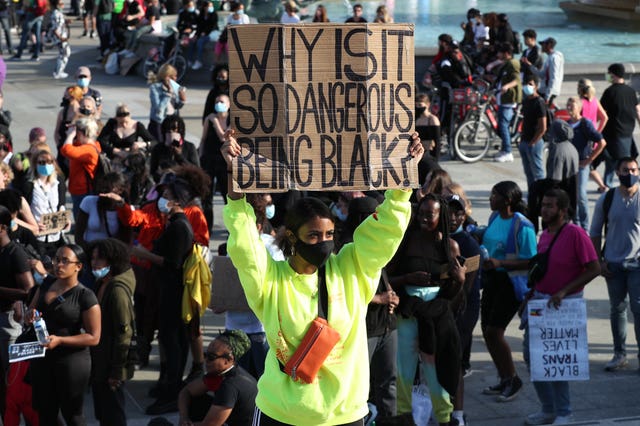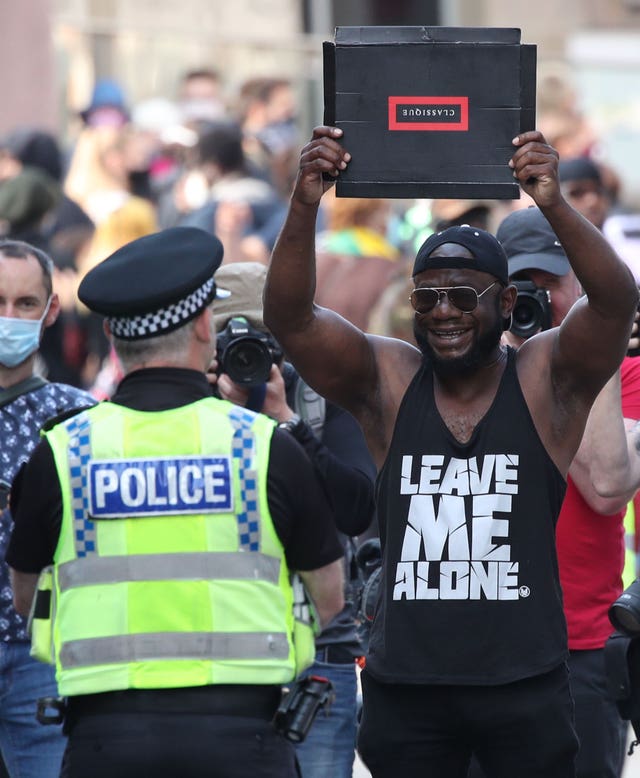Police forces are still unable to explain the disproportionate use of powers, such as stop and search and use of force, on black, Asian and minority ethnic (BAME) people, a police watchdog has found.
Police risk losing the trust of the communities they serve, Her Majesty’s Inspectorate of Constabulary and Fire and Rescue Services (HMICFRS) has warned after its latest inspection on the disproportionate use of police powers.
It highlighted how the killing of George Floyd in the US in May last year, and the Black Lives Matter protests that followed in the UK and globally, have brought to light “once again the significant impact that police interaction can have, particularly on (BAME) communities”.

In a report published on Friday, the inspectorate said data from 2019/20 shows ethnic minority people were over four times more likely to be stopped and searched than white people, and that black people specifically were nearly nine times more likely.
It said: “Over 35 years on from the introduction of stop and search legislation, no force fully understands the impact of the use of these powers.
“Disproportionality persists and no force can satisfactorily explain why.”
Force
Data from the same time period found black people were about 5.7 times more likely to have force used on them than white people, with figures showing they were more than nine times as likely to have Tasers drawn on them.
The report reveals black people were also eight times more likely to be handcuffed while compliant and three times more likely to have a spit and bite guard used on them than white people, for reasons the inspectorate said are “unclear”.
Brandishing the use of these powers as “unfair”, HMICFRS warned this risks further reducing public trust in the police and could lead to more black and ethnic minority people being drawn into the criminal justice system, as well as disrupt their education and family lives and reduce their work opportunities.
“It feeds perceptions among the public and police about black people and crime, and may also influence how the police allocate and deploy resources,” Inspector of Constabulary Wendy Williams said in the report.

While improvements were made in 2018/19 in monitoring stop and search, the report states too many police forces still do not analyse and monitor enough information and data “to understand fully how fairly and effectively the powers are used”.
Inspectors found the most common reason given for the use of stop and search is due to suspected drug possession “rather than supply”, which it said indicates that “efforts are not being effectively focused on force priorities”.
It cited one such priority as county lines, the criminal network of gangs that use a dedicated mobile phone line to distribute drugs, usually from an urban area to a smaller town.
“Forces often cite county lines as a reason for stop and search, but to be most effective, policing tactics to address this need to target drugs supply more effectively,” HMICFRS said.
The inspectorate is calling on police leaders to consider whether focusing stop and search on tackling drug possession is an effective use of these powers.
Ms Williams said: “Unfair use of powers can be counterproductive if it leads people to think it is acceptable to not comply with the law.
“It may also make people unwilling to report when they are the victim of crime or come forward as witnesses.
“The police must be able to show the public that their use of these powers is fair, lawful and appropriate, or they risk losing the trust of the communities they serve.”
Concern
The Independent Office for Police Conduct (IOPC) welcomed the report and said the use of stop and search powers “within certain communities has long been a cause for concern”.
IOPC director general Michael Lockwood said: “Only by understanding the causes of this disproportionality – and helping officers to understand fully how their use of stop and search and use of force impacts on those most affected – can we start to make the changes that are needed.
“The HMICFRS report highlights the fundamental shift we need to see in the culture of policing in being open and accountable when concerns are raised.”
The National Police Chiefs’ Council (NPCC) said it is developing plans to address the disproportionality in the use of stop and search and to “explain it and take action to reduce it wherever possible”.
NPCC’s lead for stop and search, deputy assistant commissioner Amanda Pearson, said the police body will “consider the recommendation around the best approaches to tackling drug crime”.
She added: “We hold the power of stop and search on behalf of the public so it is vital our communities have confidence in the way it is used and that officers have the confidence to use it effectively and appropriately.”
Policing minister Kit Malthouse said stop and search saved lives after it helped remove 11,000 dangerous weapons from UK streets last year, adding that young black men are disproportionately more likely to be the victims of knife crime.
He added: “We are committed to ensuring that stop and search is conducted lawfully, and that safeguards, including training, guidance, and body worn video, are in place to help ensure it is used effectively, and that nobody is stopped solely on the basis of their skin colour.”
Related: Reactions as Farage’s asylum seeker Covid claims denied by Home Office

